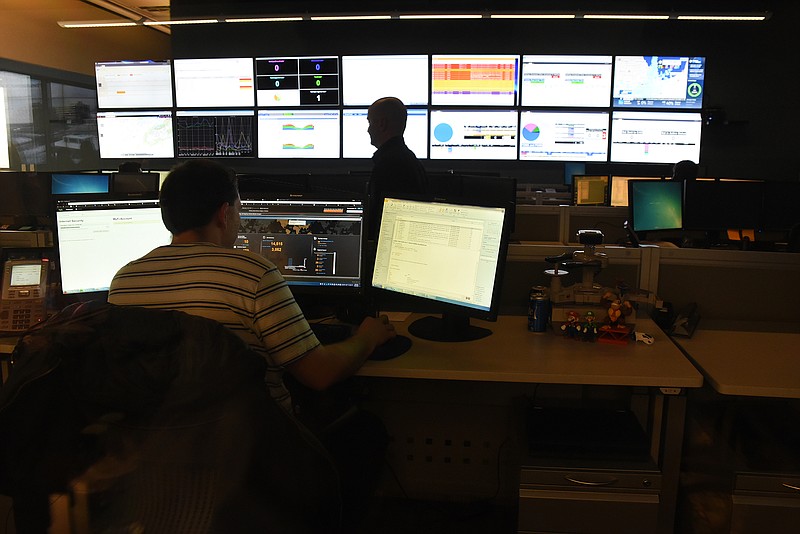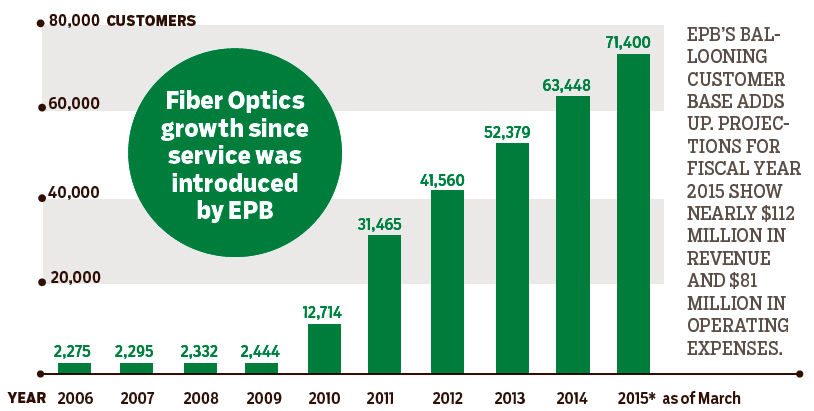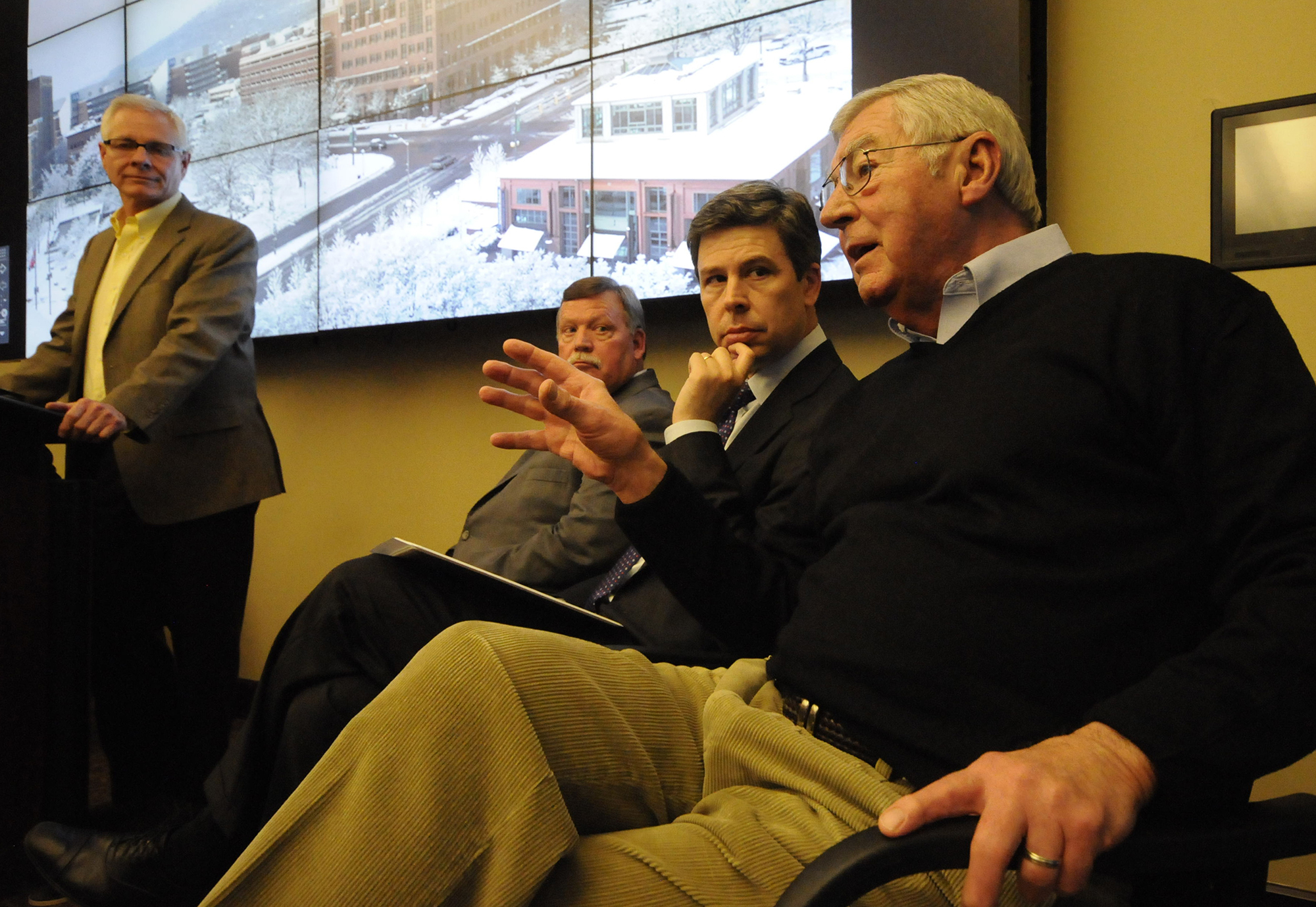More people than ever turn to EPB to connect to the Internet, watch television and get phone and television service.
Today, the city-owned utility in Chattanooga serves about 71,400 homes and businesses, up nearly 13 percent in the last eight months, keeping EPB on track for gaining more than 10,000 customers a year since it started offering fiber-optics services in 2009.
Those gains could grow drastically in coming years, given a recent federal ruling that lets EPB expand its footprint, as well as state legislation that could allow the same. And even if EPB can't expand where it operates its telecommunication services, the utility's executives say they expect it to continue to grow.
EPB fiber optics
Customers: * 65,808 residential (45 percent of the market) * 5,574 businesses Services they get: * 62,686 Internet (5,265 of those subscribe to 1-Gbps) * 52,893 video/television * 31,896 phone
By the numbers
* $111.7 million: Projected revenues in fiscal 2015, up from $99.9 million last year * $13.2 million: Projected operating income in fiscal 2015, down slightly from $15.1 million last year * $10 million: Fiber optic system access fees and rents paid to electric system in 2014 * $13 million: Fiber optic system allocation to electric system in 2014 * $1,200: Average cost of hooking up new fiber optic customer for EPB Source: EPB Fiber
"There's still a huge market out there," said Joe Ferguson, chairman of EPB's board of directors.
Best known for its Gigabit-per-second Internet service, EPB counts users of that speed as a small fraction of its customers, only 5,265.
Indeed, super-speed Internet isn't what got Stanley Young to make a switch from Comcast, which he used from 2008 until early last year. For him it was ease of mind, helped along by EPB's good customer service.
"Their prices don't fluctuate," Young said. "When you get a bill, your bill will be the same every month. And EPB doesn't bill you so far ahead." One more: Comcast charged him to pay his bills by phone and EPB doesn't.
"It just seems more of a smooth-operating business," said Young, 26, site supervisor for University of Tennessee at Chattanooga's Gear Up. He has 100 megabit-per-second Internet service and a Fi TV Silver plan. Through Comcast, he had Internet service, though slower, as well as television service.
It's hard to compare EPB's growth with that of Comcast and AT&T, the other major telecom providers in the area. The private phone and cable companies don't disclose customer numbers, and each serves a broader geographic area than does EPB, which serves most of Hamilton County and parts of eight other counties in Tennessee and Georgia.
Comcast can deliver service for phone, video/television, Internet and home security to 99 percent of Hamilton County, a company spokeswoman said. The company is also Tennessee's largest Wi-Fi provider, she said.
"There's more to the big picture than just fast speeds to a limited footprint," Sara Jo Houghland Walker said. "It's critical to deliver on a full suite of services to the most homes and businesses, and to continue investing in our communities."
One point of comparison is franchise fees for video/television service (which AT&T and Comcast refer to as "cable") that each provider pays to the city of Chattanooga, but just for Chattanooga subscribers. Those fees correlate with subscriber numbers, so higher total fees mean more customers.
To that end, Comcast has been the leader, paying $1.5 million last fiscal year, compared with $60,800 for AT&T and $881,600 for EPB. But each company's numbers dropped compared with 2013, while EPB's rose: In 2013, Comcast paid $1.6 million and AT&T paid $62,800, while EPB paid $692,000.
EPB officials said they couldn't comment on Comcast's fees but said that they haven't been able provide immediate service to some multi-dwelling units, such as apartment complexes, whose residents can only get Comcast or AT&T.
Both Comcast and AT&T have expressed resistance to the Federal Communications Commission's late February approval allowing EPB to expand service beyond its footprint. That ruling became effective March 12, but petitions for reconsideration can be filed through April 13, and appeals can be filed through May 11.
Representatives from AT&T and Comcast declined to comment on how the ruling or potential Tennessee law could affect their subscriber base or if they intend to take any action against the ruling.
Meanwhile, Comcast is working toward offering multi-Gig speed Internet service, though it's not yet clear where in the nation that might roll out or when. The company plans to complete a trial late this year.
"Where we'll test hasn't been determined yet," said Comcast spokesman Charlie Douglas. "We'll see how it works in the market, then begin to roll it out. It's a multi-step process."
EPB celebrated the FCC ruling within hours of it happening on Feb. 26 and has said it's poised to move into southern Bradley County, which is woefully underserved for Internet use. But for now, it will wait to see what happens with state legislation in Nashville that would allow expansion.
"Our hope is that we can get a resolution on a state level," EPB spokesman John Pless said. "We continue to work with state senators and state representatives."
EPB launched its fiber-optic services in 2009, and they became more widely available in 2010. Between those years the utility saw a 150 percent increase in customers.
"There was pent-up demand in this market for fiber-speed broadband service," said J.Ed. Marston, EPB's vice president of marketing. The utility first offered 15 megabit-per-second service, which later jumped to 50 mbps then 100 mbps. Around launch time, the industry standard was between 5 and 25 mpbs. And, of course, the utility also offered 1 Gigabit-per-second service out of the gate, though it's never been the most popular speed.
EPB's ballooning customer base comes with financial success too: Within a couple of years of its launch, the fiber optic division turned a profit, and EPB's operating expenses in that department have been considerably below revenue ever since. Projections for fiscal year 2015 show nearly $112 million in revenue and $81 million in operating expenses.
"We consistently were under budget," EPB President Harold DePriest said recently of EPB's growth. "We consistently were ahead of schedule."
Contact staff writer Mitra Malek at mmalek@timesfreepress.com or 423-757-6406. Follow her on Twitter @MitraMalek.


